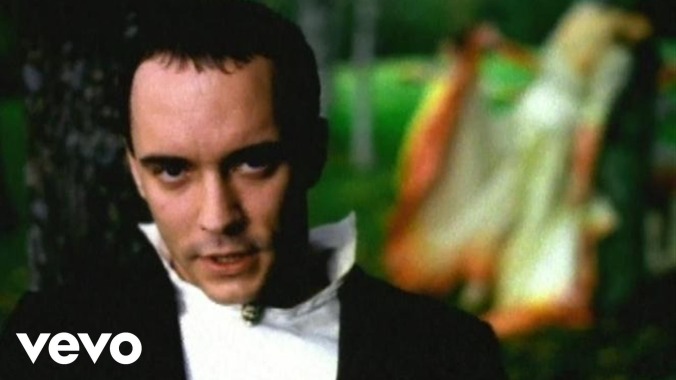The heart of Lady Bird is an old Dave Matthews song about jacking off

The following article divulges major plot details from Lady Bird.
In 2002, when Lady Bird is set, the Dave Matthews Band’s erotic ballad “Crash Into Me” had been out for some six years. It was not cool. To be clear, the Dave Matthews Band had never been cool, but “Crash Into Me” is the band at their least cool, at once generically romantic and creepily specific in its sexual yearnings. Matthews’ feathery guitar line has a nice rhythmic snap to it, sure, but it eventually melts into that syrupy smooth-jazz chorus and those iconically, shall we say, damp lyrics. (Sing along: “I come into you / In a boy’s dream”; later: “Hike up your skirt a little more / And show the world to me.”) That it was a smash hit upon its original release speaks directly to the “you complete me”-style sexuality of the ‘90s, but for still-unexplainable reasons it lingered for years afterward, like the scent from an ill-advised hot oil massage.
This is part of what makes its use in Lady Bird so deeply perfect. Its placement is of a piece with the rest of the film’s musical choices, which prioritize verisimilitude over the sort of cuteness that generally dominates era-specific soundtracks. The film’s musical picks aren’t the throwback curation of, say, Linklater, cherry-picking favorites that gloss over the reality of the era, nor do they pander to the easy jokes that turn-of-the-millennium music could provide in lesser hands. Greta Gerwig could’ve gotten laughs with Shaggy’s “It Wasn’t Me” or The Baha Men’s “Who Let The Dawgs Out”; instead, she recreates the deeply strange image of a gymnasium full of white kids slow-dancing to Bone Thugs-N-Harmony’s “Crossroads.” A sprawling house party booms with Justin Timberlake’s “Cry Me A River,” a song whose celebrity melodrama felt like the ultimate popular-kid intrigue of the era. The late ’90s and early 2000s are an era ripe with musical punchlines, full of rap rock and frosted tips, and yet Lady Bird approaches the music with unchecked affection. Ska even feels fitting as the soundtrack to a bunch of theater kids giggling over microwaveable snacks.
But no song gets more play than “Crash Into Me.” The first time it airs, Lady Bird (Saoirse Ronan) has just walked in on her boyfriend making out with another boy, and so she and best friend Julie (Beanie Feldstein) hold hands and sob in a car while listening to the track. The next time the song pops up on the radio, cooler sorta-boyfriend Kyle (Timothée Chalamet) declares he hates it; Lady Bird, steeling herself, says she loves it all the same, signifying her final rift from him. Moments later, she’s goofing off with Julie at the dance as a stag twosome in a montage set to the track. The net effect of this is to fade from “Crash Into Me” playing diegetically to “Crash Into Me” playing non-diegetically, hammering in the song’s ubiquity, not just in Lady Bird’s life but in the era itself. It’s one of the tightest and most wry little jokes in a movie teeming with them.
Like a lot of those jokes, it feels lighter than it is. “Crash Into Me” serves as the movie’s unlikely spine, with each act hinging into the next alongside the breakup-to-“Crash” routine. We don’t, after all, get to pick the music that matters to us in adolescence, at least not consciously, and certainly not during breakups—it’s just sort of there for us when we happen to need it, even if it happens to be about a voyeur’s masturbatory fantasy. The film ends with glimpses into Lady Bird’s college dating life, with a guy disdainfully leafing through her CD wallet; if you were in college around then, you know you couldn’t sneeze without hitting a melancholy dude finger-picking “Crash Into Me” on an acoustic guitar, all of which bodes poorly, at least for her immediate romantic future. But instead the movie ends mid-cycle, with Lady Bird calling her mom to accept the hometown, the family, even the birth name she’d been so desperate to shed. The film itself serves as a nod of acceptance to the music of the era, adding to its sweetness. We’ve all got musical skeletons in our closet, but Lady Bird reminds us how they got there.